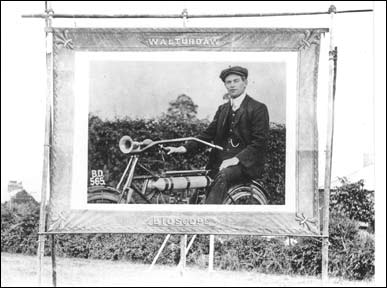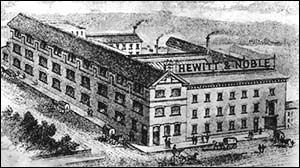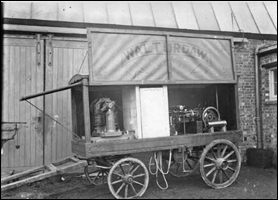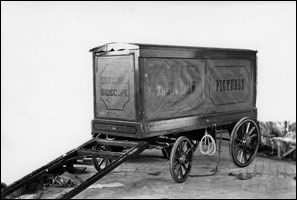|
|
|||||
| Article by John Comont | |||||
|
The arrival of moving pictures in Rushden
|
|||||
|
|||||
|
In this age of instant communication it is difficult to imagine the excitement that the first showing of moving pictures must have generated only a few short generations ago. After slaving away in the shoe factories for day after day the rapidly expanding population of Rushden were eager for some excitement. Local entrepreneur William Hewitt was quick to see the opportunity that this represented.
In 1889 William Hewitt, originally a shoe retailer from London, arrived in Rushden with his wife, their son William jnr. (W F J Hewitt) and his new wife Ellen, and together they bought into the shoe trade and became partners in the major shoe company Hewitt and Noble. They bought land at the corner of Brookfield and Wellingborough roads and built two houses adjacent to the factory in Glassbrook road. In 1896 the factory changed its name to Hewitt & Hewitt.
The junior Hewitts enjoyed the thrill of the theatre. They were founder members of the Rushden Amateur Dramatic Society in the 1890’s and both took the lead in a number of plays. Early productions included “Snowdrift” in 1898, “The Purser” and “black eyed Susan” in 1899 and “Much ado about nothing” in February 1901 at the Public Hall. There was evidently a huge appetite for this entertainment and a newspaper report of the time stated; The house was crowded every night and on Saturday the hall was packed by those entering the “early” doors while a crowd of several hundred people stood outside. The Hewitts, with others, formed the Public Hall Theatre Company in 1902. Mr Hewitt junior kept the accounts. They brought in professional entertainers, music hall turns, plays, concert parties and even the life guards band to perform in the Public Hall in Coffee Tavern lane at the rear of the Waverly hotel. Over 40 shows were staged between 1902 and 1907. Whilst a cultural success, the shows did not seem to make money and, after running at a loss for at least two years, the Theatre Company appears to have petered out in 1907 Disaster struck the Hewitt family on 23rd March 1904 when fire swept through the Hewitt & Hewitt factory. Mr Hewitt junior, his wife and family, Leonard, Wilfred and his twin sister, left the Wellingborough road house to live at 20 Essex Road. The Hewitts carried on in the shoe trade for a number of years but times were hard and they were casting around for a new means of livelihood. Moving pictures were developed at the very end of the nineteenth century and in 1907 the Hewitts arranged a kind of franchise with the Walturdaw Cinematograph company. Profits were shared between the two companies. A projector and limelight equipment was bought costing £28-13-9 and on the Ist of February 1908 the first show was given at Thrapston. This was followed quickly by another show on February 3rd at Irthlingborough. Both shows made a loss but on the 29th February at Rushden 416 happy viewers produced the first profit, the princely sum of £3-9-9. Film shows followed for weeks at a time in both Rushden and Wellingborough as well as at “one off” venues such as Harrold flower show, St Neots fete, Olney Town band and Newton Road school. Financial success appears to have been mixed but in 1909 the family took the opportunity to invest in Electric Carbon arc lights and accessories cost at the substantial cost £28-19-0. The family travelled widely with their new equipment, engaging pianists, comedians and other performers. Initially films were short, some running for little more than 5 minutes. Films on travel, racing, royal events and comedies were interspersed with stage turns. Gradually films became longer and included epics such as the Battle of Waterloo. Sometimes a Sunday matinee may have included religious slides. They visited Kettering, Bedford, Peterborough, Loughborough, Nuneaton, Worksop, Atherston, Hinkley, Market Harborough, and Raunds. They were very popular, spending three weeks at Lincoln and returned to Rugby three times, but for some reason the programme did not go down well in Leicester and they lost £50 in 2 weeks! Touring ended on January 1st 1910 as by then they had other plans coming to fruition. In both Rushden and Wellingborough theatres with the capacity to show films opened in 1910 and in the same year the Hewitt family moved to Wellingborough. With Mr George Brown of Rose Hill, Wellingborough, they formed the Wellingborough Palace Theatre Company. They bought the site of the old skating rink and built The Palace, opening on 23rd October 1911. The Palace Theatre company later grew to control the Palace and Regal cinemas in Wellingborough and the Palace and Ritz Theatres in Rushden. William and Ellen's sons, Wilfred and Leonard went on to manage cinemas in Rushden and Wellingborough respectively whilst William senior had the honour, in later years, of serving as a deputy on the British Board of Film Censors. The name Hewitt was synonymous with cinema for almost fifty years.
|
|||||



